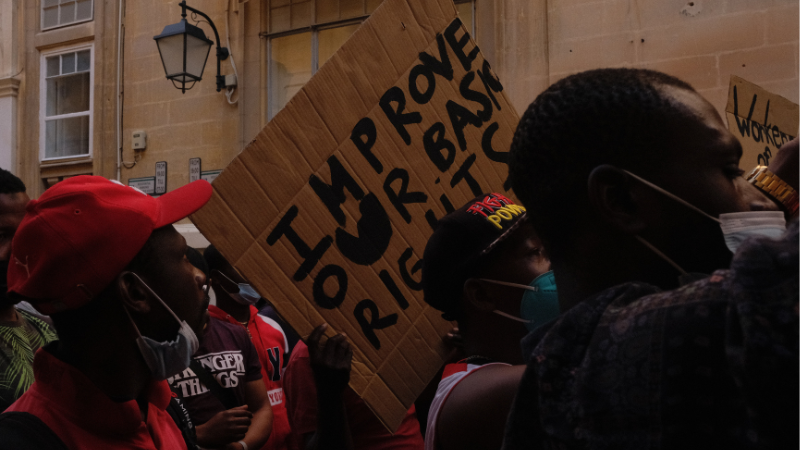The “regrettable trend” of the legitimisation of push-back practices both on land and at sea shows no sign of waning, according to the latest report by the special rapporteur on the human rights of migrants, Felipe González Morales.
Even as the special rapporteur presented his detailed report to the 50th session of the United Nations Human Rights Council (OHCHR) currently underway in Geneva, several reports continue to document instances of how migrant boats in the Mediterranean are either abandoned at sea, not allowed to safely disembark, or returned to Libya.
Currently, the German ship Sea Watch 4 with 304 individuals on board, is still waiting for a safe harbour after 7 days at sea while in another report two vessels were spotted off the Libyan coast, one of which, according to the NGO Alarmphone was carrying over 100 people and both were later intercepted by the Libyan coastguard and returned to Libya.
We have been informed the ~110 people have been found by Libyan authorities and we are happy they survived. Unfortunately they have been forced back to the place they were trying to flee from. Libya is neither a safe country nor a place of safety. #FreedomOfMovement #RightToFlee
— @alarmphone (@alarm_phone) June 26, 2022
Pushbacks remain ‘de facto’ policy
The latest report by González Morales is a study of the recent developments in migration and border governance that impact migrants’ enjoyment of their human rights and acts as a continuation of the report he presented last year in which he had urged member states to put an end to pushback practices, to respect fully the prohibition of collective expulsion and to uphold the principle of non-refoulement.
Nevertheless, González Morales concludes that, among other things, pushbacks remain the de facto general policy in many states “which have now legitimized the practices either through the introduction of legislation and by means of government executive orders. Several states have recently used these tactics as a means to whitewash unlawful practices and to pursue them as a general policy, in some cases accompanied by public relations campaigns”.
Meanwhile, Malta continues to apply the deterrence tactic of being non-responsive to distress calls and refusing disembarkation.
On 20 June, the Malta Refugee Council urged the Maltese authorities to reopen the dialogue on migration laws and practices. “The government refuses to explain why they are abandoned out at sea, either not rescued or not allowed to safely disembark,” the council said, further highlighting an “extremely hostile environment for refugees” on the island.
It also said that “hundreds are detained in squalid conditions and on dubious legal grounds in what international human rights bodies described as ‘institutional mass neglect’. New detention rules dramatically limit their possibility of (such people) receiving needed information and support”.
Frontex’s partial reforms
The report by the UN special rapporteur also notes how following the serious allegations concerning Europe’s Border and Coast Guard Agency (Frontex) that claimed Frontex-operated surveillance technology may have been misused to facilitate pushbacks to Turkey and Libya in October 2021, the European Parliament voted to freeze part of the agency’s 2022 budget and to only make it available if Frontex improved its human rights monitoring and financial, recruitment and procurement procedures.
Nevertheless, although progress has been made in reforming and expanding the border agency’s Fundamental Rights Office, which monitors the compliance of Frontex with its human rights obligations and advises it on human rights, to date the office has yet to fully recruit the 40 fundamental rights monitors who should have been in place since December 2020.
At #HRC50, the Special Rapporteur on the human rights of migrants, Felipe González Morales, presented his report to the Human Rights Council.
“The extent of preventable loss of life and human suffering at international borders remains alarming”
REPORT ▶ https://t.co/TTJhcS2MSZ pic.twitter.com/1rikbYhseK
— United Nations Human Rights Council | #HRC55 (@UN_HRC) June 24, 2022
Reminding states of their duty
In his list of conclusions, González Morales observes that the pushback policies implemented by many states continue to seriously affect the human rights of migrants who cross international borders.
He also observes how the full spectrum of such violations often remains hidden, mainly because states tend to dismiss or cover-up allegations of wrongdoing adding that “reports of pushbacks, including accounts by authoritative international and national organizations tasked with preventing torture and ill-treatment, are often dismissed by state authorities, and are not investigated promptly, thoroughly and independently”.
The special rapporteur reiterates his call upon states and all relevant stakeholders to make use of the OHCHR Recommended Principles and Guidelines on Human Rights at International Borders and once again, urges member states to put an end to pushback practices.
He also reminds states of their duty to provide prompt, adequate, and effective search and rescue services for migrants in distress on land and at sea adding that “Life-saving assistance should be a fundamental element of national border governance strategies to protect the lives of people crossing international borders and prevent migrant deaths and injuries. Any search and rescue unit receiving information about a distress incident should take immediate action if in a position to assist”.
The full report can be found here.













I read “On 20 June, the Malta Refugee Council urged the Maltese authorities …” Can someone please inform me – who is the president or chairman of this Council? Who is its CEO? Who are its members? How has the Council been elected or nominated or constituted? How is it financed? Is it a registered voluntary organisation according to Maltese law? Does it publish its annual accounts?
What a rotten state of affairs exists in global politics and institutions. Conclusions and decisions mean nothing.
And all governments are happy with this stalemate.